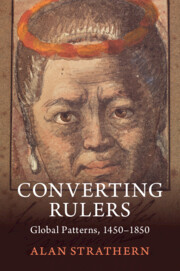Book contents
- Converting Rulers
- Converting Rulers
- Copyright page
- Dedication
- Contents
- Figures, Maps and Tables
- Preface and Acknowledgements
- Abbreviations
- Part I Concepts
- Part II Cases
- Part III Global Patterns
- 9 Hinduism and Confucianism and the Question of Transcendence
- 10 Explaining Global Patterns of Ruler Conversion
- Appendix: A Note on the Religious Typology in Relation to Gender and in Relation to Violence
- Glossary of Theoretical Terms
- Bibliography
- Index
9 - Hinduism and Confucianism and the Question of Transcendence
from Part III - Global Patterns
Published online by Cambridge University Press: 07 November 2024
- Converting Rulers
- Converting Rulers
- Copyright page
- Dedication
- Contents
- Figures, Maps and Tables
- Preface and Acknowledgements
- Abbreviations
- Part I Concepts
- Part II Cases
- Part III Global Patterns
- 9 Hinduism and Confucianism and the Question of Transcendence
- 10 Explaining Global Patterns of Ruler Conversion
- Appendix: A Note on the Religious Typology in Relation to Gender and in Relation to Violence
- Glossary of Theoretical Terms
- Bibliography
- Index
Summary
Chapter 9 suggests how Hinduism and Confucianism may be understood in relation to the construct of transcendentalism in order to set up a discussion of India and China in the final chapter. (Unearthly Powers had largely taken Christianity, Islam and Buddhism as the main examples of transcendentalist traditions.) This involves a consideration of distinct forms that the Axial Age took in both regions and the religious and philosophical traditions that emerged from them. The diverse traditions coming under the umbrellas of Hinduism and Confucianism represent very substantial continuity with the immanentist pre-Axial past, especially in a fundamental emphasis on the role of ritual action. However, they also incorporated Axial elements, particularly an emphasis on liberation/salvation in the case of Hinduism and ethical rectitude in the case of Confucianism. Confucianism remains the most awkward fit within the mould of transcendentalism because of the absence of a soteriological imperative.
Keywords
- Type
- Chapter
- Information
- Converting RulersKongo, Japan, Thailand, Hawaii and Global Patterns, 1450–1850, pp. 315 - 340Publisher: Cambridge University PressPrint publication year: 2024

